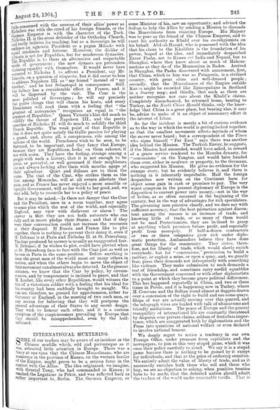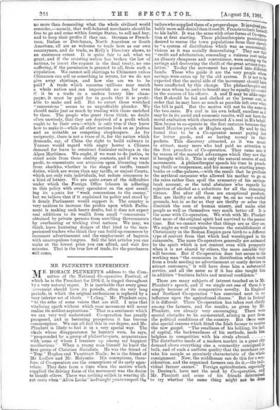INTERNATIONAL H17XTERING.
SOME of our readers May be aware of an incident in the Chinese muddle which, odd. and picturesque as it was, attracted little attention in Europe. There was a fancy at one time that the Chinese Mussubnans, who are numerous in the province of Kansu, on the western border of the Empire, might_ .prove to be a serious force in the contest with the Allies. The idea originated, we imagine,- with General Tung,. who had commanded in Kinsu ; it readtd,the_Legations in Pekin, and was reflected back as rather important to,. Berlin. The,. German Emperor, or some Minister of his, saw an opportunity, and advised the Sultan to help the Allies by sending a. Mission to dissuade the.. Mtissulmans from resisting Europe. His Majesty was to pose as the friend of the Chinese Emperor, and to exert his authority as Khalif over his co-religionists on his behalf. Abd-ul-Hamid. who is possessed with the idea, that his claim to the Khalifate is the foundation of his power, leaped at the idea, and immediately despatched Enver Pasha, not to Kansu rid India and Nepaul, but to Shanghai, where they know about as much of Mahom- medans as they do of the Mennonites in Baden. Arrived in Shanghai, the Pasha discovered with amazement, first, that China, which to him was as Patagonia, is a civilised country, .. with great cities and well-dressed people ; secondly, that the Mussulmans of the Empire outside Kanni might be recorded like Episcopalians in Scotland in a Survey map ; and thirdly, that such as there are neither • recognise nor care about the Khalif's claims. Completely disenchanted, he returned home, bearing to Turkey, as the North China Herald thinks, only the know- ledge that China is a great place, but bearing also, it may be, advice to make of it an object of missionary effort in the interest of Islam.
So far the incident is merely a, bit of curious evidence as to the way in which the world is getting locked together; so that the smallest movement affects myriads of whom the mover never heard ; but a correspondent of the Times who. signs himself " Far -East " says there was another idea behind the Mission. The Turkish Envoy, he suggests, if the Mission had succeeded,.would have asked, in reward of a grave service rendered to the Manchu dynasty, for " concessions " on the Yangtse, and would have handed them over, either in usufruct or property, to the Germans; who suggested his Mission. He gives no evidence for the strange story, but he evidently believes it, and there is nothing in it inherently improbable. Half the foreign despatches now written on the Continent have for object some • gain in cash or promises to pay. The very worst symptom in the present diplomacy of Europe is the disposition to convert power into money,—not in the way of bribes, as so often occurred in the beginning of the century, but in the way of advantages for rich speculators. The governing men perceive clearly, and ive dare say with sufficient accuracy, that the best protection against discon- tent among the masses is an increase of trade, and knowing little of trade, or so many of them would not be mad Protectionists, they are inclined to grasp at anything which promises future profit, and especially profit from monopoly. If half-a-dozen contractors or two or three companies grow rich under diplo- matic protection, Ambassadors believe they have done great things for the community. They' strive, there- fore,-not for liberty of trade, which would slowly enrich everybody, but for "concessions," permission to build a railway, or exploit a mine, or open a qua)-, and, we greatly fear, press their demands not infrequently with something like violence. They make submission to such demands a test of friendship, and sometimes carry sordid squabbles with the Government concerned or with other diplomatists to a point at which they become grave political differences. This hae.bappened repeatedly in China, and two or three times in Persia, and it is happening now in Turkey, where 31. Constans and the Sultan stand almost at daggers drawn over a concession of the right to build and use some quays. Ships of war are actually moving over this quarrel, and -the telegraph wires are loaded with talk of ultimatums and friendly mediations. The peace of Europe and the general tranquillity of international life are constantly threatened by disputes over private claims, seldom of first-class impor- tance, which are exaggerated both by diplomatists and the Press into questions of national welfare or even declared to involve national honour.
We deeply regret to notice a tendency in our own Foreign Office, under pressure from capitalists and the newspapers, to join in this very stupid game, which it was once their policy carefully to avoid. We say it is a stupid, game because there is nothing to be gained by it except for individuals, and that at the price of enduring enmities. We entirely admit the value of liberty of trade, and as it necessarily enriches both those who sell and those who buy, we see no objection to asking, when punitive treaties have to be made, that the. defeated. nation should admit. the traders of the world under reasonable tariffs. That is no more than demanding what the whole civilised world concedes,—namely, that well-behaved merchants should be free to go and come within foreign States, to sell and buy, and to keep their profits'if they can. German or French- man, Italian or Dutchman, North American or South American, all are as welcome to trade here as our own countrymen, and do trade, as Kelly's Directory shows, to an enormous extent. It is quite fair to ask what we grant, and if the resisting nation has broken the law of nations, to insert the request in the final treaty, no one suffering, if the permission is granted to all, from such a stipulation. We cannot sell shirtings to Chinamen unless Chinamen can sell us something in return, for we do not give away shirtings, and how else are we • to be paid ? A trade which concerns .millions may enrich a whole nation and can impoverish no one, for even if it be a trade in a useless luxury like • cham- pagne, it must be paid for in goods that it is profit- able to make and sell. But to extort these wretched "concessions " seems to us unprofitable plunder. We should make just as much by trading with those enriched by them. The people who grant them think, no doubt often unwisely, that they are deprived of a profit which ought to be their own—which is only true if they know how to make it—while all other nations look on as Jealous and as irritable as competing shopkeepers. As for reciprocity, there is not a trace of it, for the nation which demands, say, of China the right to build railways in Yunnan would regard with angry horror a Chinese demand for leave to construct funicular railways in the Alpes Maritimes. We ought, if we want to do justice, to stand aside from these shabby contests, and if we want profit, to concentrate our attention upon liberating trade from shackles, whether in the shape of tariffs, transit duties, which are worse than any tariffs, or unjust Courts, which not only ruin individuals, but reduce commerce to a kind of lottery. We are quite aware of the difficulties under which the Foreign Office :labours in adhering to this policy with every speculator on the spot assail- ing its agents for "weak concessions to the enemy," but we believe that if it explained its policy and stood by it firmly Parliament would support it. The country is very anxious to increase the- profits upon which Parlia- ment is making such heavy drafts, but it does not expect real additions to its wealth from small " concessions ' obtained by private persons from unwilling Governments by overbearing or tricking rival nations. We may, we think, leave huxtering dodges of that kind to the inex- perienced traders who think they can build up commerce by incessant advertisement and the employment of bagmen with unscrupulous tongues. Sell the best articles you can make at the lowest price you can afford, and wait five minutes. That is the true law of trade, for the purchasers will come.



































 Previous page
Previous page